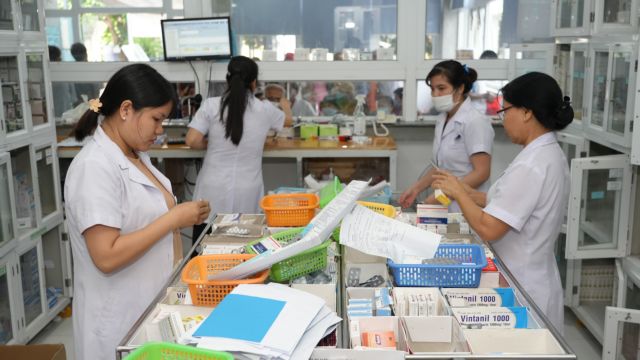 Opinion
Opinion

 |
| Trần Đức Hiệp, LLM serves as the legal advisor for various hospitals in HCM City. — Photo courtesy of Brand and Law Co Ltd |
CEO of Brand and Law Co Ltd Trần Đức Hiệp, who also serves as the legal advisor for various hospitals in HCM City, talks to Kinh tế & Đô Thị (Economic & Urban Affairs) newspaper about the necessary legal measures to address the recurring shortages of medical supplies across the healthcare system.
The shortage of pharmaceutical and medical supplies at healthcare facilities is not a new issue. What is the main reason for this situation?
In reality, there are many reasons that could lead to shortages of pharmaceutical and medical supplies. These include objective factors such as fluctuations in materials, scarcity of goods and increasing prices on a global scale, all making procurement of medical drugs, supplies, chemicals and biological products more difficult.
In addition, following the COVID-19 pandemic, there was a surge in the number of people seeking health check-ups, exceeding the capacity of medical facilities in terms of medications and medical supplies.
Regarding subjective factors, the supply shortage comes from slow drug licensing and renewal of licences, a reluctant psychology in medical supply procurement due to fear of committing violations, the lack of human resources capable of organising bids and slow progress in procuring drugs subjected to national centralised bidding, while small-quantity bid packages are unable to attract suppliers.
The Law on Bidding took effect from January 1 this year, are there any guidelines to implement the law. What is your assessment of the legal documents from a legal perspective?
Regarding the document detailing the implementation of this law, the Government issued decrees No 23/2024/NĐ-CP and No 24/2024/NĐ-CP on February 27, 2024 which specifies several clauses and measures to enforce the 2023 Law on Bidding in regard to investor and contractor selection.
As guidelines for preparing bidding documents and evaluation, appraisal and report requests, as well as the general bidding processes for all sectors, from February to April 2024, the Minister of Planning and Investment approved several circulars such as No 01/2024, 03/2024, 05/2024, 06/2024, 07/2024/TT-BKHĐT.
Regarding drug procurement and bidding, the Minister of Health issued Circular No 04/2024/TT-BYT on April 20, 2024, which stipulates the principles and criteria for drafting and listing the national centralised procurement for drugs. Circular No 05/2024/TT-BYT was also issued on May 14, 2024 to stipulate the list of drugs, medical equipment and testing supplies eligible for price negotiations, as well as the contractor selection procedures for bidding packages eligible for price negotiations.
The Ministry of Health also issued Circular No 07/2024/TT-BYT on May 17, 2024 on drug bidding activities using the State budget, health insurance fund and other legal revenue sources of public administrative agencies on healthcare and public health facilities. These include the categorisation of drugs and bidding packages, drug supplier selection procedures, and centralised drug procurement.
Regarding bidding and procurement of medical supplies (including medical equipment and chemicals, according to Article 2 of Decree No 98/2021/NĐ-CP on medical supply management), the health ministry has issued Circular No 14/2023/TT-BYT dated June 30, 2023 stipulating the bidding package drafting procedures for medical supply procurement and servicing. These include procuring medical equipment, purchasing of replacement components and materials for existing equipment, as well as repair, maintenance, inspection and calibration services for medical devices.
Therefore, the comments saying that there have been no guidelines for pharmaceutical and medical supply procurement are completely untrue. In theory, when a legal document is issued by the legislature, it takes some time for the executive body to apply specific regulations into practice.
Pharmaceutical and medical supplies are crucial to health examination and treatment, therefore, Government agencies and ministries have been very active in issuing detailed regulations and guidelines.
In addition, medical facilities assigned to be in charge of biddings, especially centralised bids, need time to fully apply the sector’s general and specific regulations to their work.
The drug bidding process also takes time. Usually, it takes at least four months from the issuance of bidding invitations to contractor selection results. Therefore, I believe that the drug shortage will be gradually alleviated.
 |
| Pharmacists sort out prescription drugs at Tây Ninh Provincial General Hospital. — VNA/VNS Photo Minh Phú |
What are the radical solutions to prevent recurring pharmaceutical and medical supply shortages?
To effectively address the shortage of medical supplies, we need to look straight into the current problems to devise solutions.
In my observations, from March 2024 until now, there have been about 710 bidding dossiers on medical supplies and over 700 drug bidding dossiers filed on the National Bidding Network System, showing how the new bidding regulations are coming into practice.
However, it is necessary to acknowledge that the current bidding regulations, particularly on drug and medical supply procurement, are extremely complex. Therefore, those in charge of drafting the bidding package, appraisal and expertise not only have to excel in their profession (medicine and pharmacy), possessing technical knowledge of the equipment, but also thoroughly understand each regulation in the bidding law as well as the related guidelines. Only then can they be confident in drafting, appraising and evaluating bidding packages.
In addition, pharmaceutical and medical supplies are inherently associated with a high level of intellectual and technology, some even include brand or equipment exclusivity. Therefore, strict application of the Law on Bidding will not necessarily lead to suitable suppliers for a hospital’s available equipment. On the other hand, for the same type of device and with the same purpose of use, different departments with different capacities will have varying requirements in terms of technical specifications and application. Therefore, facilities seeking to make purchases have significant concerns about how to avoid violating regulations restricting competition when preparing bidding documents.
I recommend that the Ministry of Health and relevant departments organise training sessions on medical bidding for those involved in organising bids, appraisals and expertise. I also suggest capable medical facilities seek consultancy on the bidding law in the context of the health sector.
It is time for healthcare legal affairs to be carried out comprehensively among public hospitals. This will not only help physicians and pharmacists feel assured in their jobs but also protect the legitimate rights and interests of medical facilities against contractors. I have participated in numerous meetings with contractors and there are tense mental battles to ensure the rights of the hospitals when contractors also have their own legal teams. — VNS




